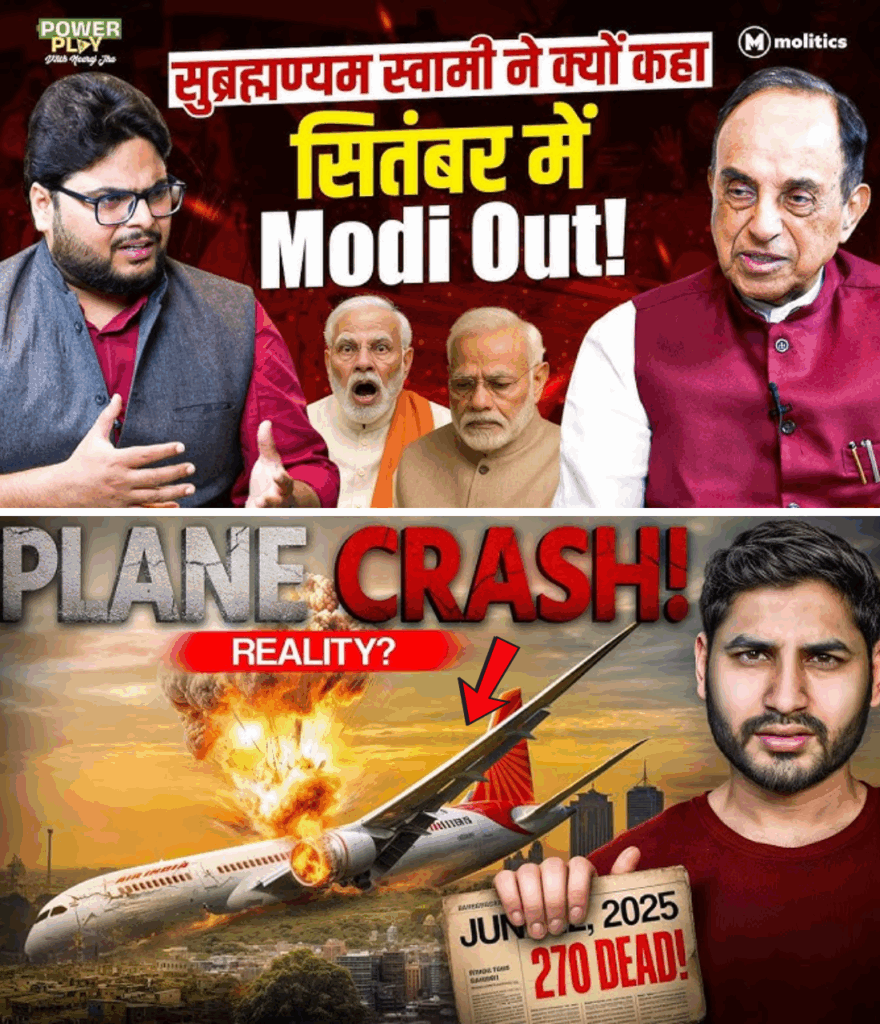In a candid and wide-ranging interview, senior politician and economist Dr. Subramanian Swamy launched a series of scathing criticisms against the current BJP government, Prime Minister Narendra Modi, and the party’s leadership. Dr. Swamy, known for his forthrightness and independent stance, did not mince words as he addressed issues ranging from national security and foreign policy to internal party politics and the state of the Indian economy.
Leadership and Internal Politics
Dr. Swamy alleged that key BJP leaders, including Amit Shah and Arun Jaitley, played pivotal roles in Modi’s rise to power, with Jaitley acting as Modi’s “manager” and Shah as the party’s “enforcer.” He claimed that within the party, there is a widespread belief regarding Amit Shah’s involvement in controversial incidents, such as the death of Judge Loya, yet these issues are swept under the rug and those implicated continue to be promoted.

Swamy also reflected on his long association with Modi, recalling the Prime Minister’s humble beginnings in student politics. He expressed disappointment at Modi’s transformation after attaining power, suggesting that the leader changed fundamentally and now suppresses dissent within the party.
Nationalism and Foreign Policy
Dr. Swamy questioned the BJP’s claims of nationalism, pointing to what he described as a pattern of submission to the United States and China on key strategic issues. He criticized the government’s response to terrorist attacks, such as the Pahalgam incident, and accused Modi of failing to stand up to foreign leaders, particularly after U.S. intervention following Indian military actions against Pakistan.
Swamy argued that India missed opportunities to assert itself more forcefully on the global stage, especially in relation to Pakistan and China. He suggested that, unlike previous leaders, Modi lacks the courage to confront these challenges head-on, instead opting for ceasefires and diplomatic compromises.
Economic Critique
Turning to the economy, Dr. Swamy challenged the government’s narrative of rapid growth and poverty alleviation. He dismissed official statistics as misleading, claiming that India’s real growth rate under Modi has not exceeded 4%, compared to higher rates under previous administrations. Swamy criticized the government’s handling of economic data and accused it of fostering crony capitalism and rising inequality, citing Oxfam reports and the concentration of wealth among a small elite.
He also questioned the rationale behind major defense purchases, such as the Rafale deal, alleging internal opposition from figures like the late Manohar Parrikar and suggesting that the deal was pushed through despite concerns about its suitability for India’s needs.
Party Discipline and Media Suppression
Dr. Swamy lamented the lack of internal democracy within the BJP, arguing that open debate is stifled and dissenters are sidelined. He claimed that the media receives instructions not to give him coverage and that there is a broader effort to make outspoken critics within the party irrelevant.
Religious and Social Issues
Addressing the issue of Hindu nationalism, Swamy maintained that India has been a Hindu nation for centuries but rejected the use of Hindutva as a tool for oppressing minorities. He condemned mob lynching in the name of cow protection and emphasized that the constitution must prevail over historical grievances.
The Road Ahead
Looking forward, Dr. Swamy predicted significant political changes by September 2025, hinting at major decisions at the government or organizational level that could reshape the leadership landscape. He expressed skepticism about the BJP’s future under Modi, suggesting that the Prime Minister may fall while the government or party continues.
Final Thoughts
Dr. Swamy concluded by reiterating his commitment to truth and transparency, advocating for open debate and accountability in Indian democracy. He invited government economists to publicly debate him on the country’s economic performance, confident that his analysis would withstand scrutiny.
The interview, marked by its candid tone and controversial assertions, underscores the deep divisions and debates within Indian politics as the nation navigates complex domestic and international challenges.
News
सुबह की हवा में सड़ांध घुली हुई थी। रेलवे लाइन के पास पड़ा कूड़े का ढेर सूरज की पहली किरणों में चमक रहा था। प्लास्टिक, सड़ी सब्जियां, फटे अखबार और ऐसी चीज़ें जिनकी पहचान करना भी मुश्किल था। उसी ढेर के पास झुका हुआ एक लड़का अपने फटे बोरे में कूड़ा भर रहा था।
सुबह की हवा में सड़ांध घुली हुई थी। रेलवे लाइन के पास पड़ा कूड़े का ढेर सूरज की पहली किरणों…
कैलिफ़ोर्निया की सुबह हमेशा की तरह सुनहरी थी। सूरज की किरणें ऊँची इमारतों के शीशों से टकराकर चमक रही थीं, लेकिन जेक एंडरसन के लिए वह रोशनी किसी वरदान जैसी नहीं थी। पेंटहाउस की खिड़की से आती हर किरण उसके भीतर की एक और दरार को उजागर कर रही थी।
जब टूटना ही शुरुआत बन गया कैलिफ़ोर्निया की सुबह हमेशा की तरह सुनहरी थी। सूरज की किरणें ऊँची इमारतों के…
जब टूटना ही शुरुआत बन गया
जब टूटना ही शुरुआत बन गया कैलिफ़ोर्निया की सुबह हमेशा की तरह सुनहरी थी। सूरज की किरणें ऊँची इमारतों के…
हवा से रोशनी तक: आरव यादव की कहानी
हवा से रोशनी तक: आरव यादव की कहानी उत्तर प्रदेश के बलरामपुर जिले का एक छोटा-सा गांव। धूल भरी गलियां,…
क्या आपने कभी सोचा है कि जो इंसान अपनी पूरी ज़िंदगी अपनों की खुशियों के लिए जला देता है, उसे आख़िर में क्या मिलता है?
परदेस की कमाई, अपनों की कीमत क्या आपने कभी सोचा है कि जो इंसान अपनी पूरी ज़िंदगी अपनों की खुशियों…
सीट नंबर 21 – एक सफ़र, जो ज़िंदगी बन गया
सीट नंबर 21 – एक सफ़र, जो ज़िंदगी बन गया दोस्तों, कहते हैं न—कभी-कभी ज़िंदगी हमें ऐसे रास्तों पर ले…
End of content
No more pages to load






